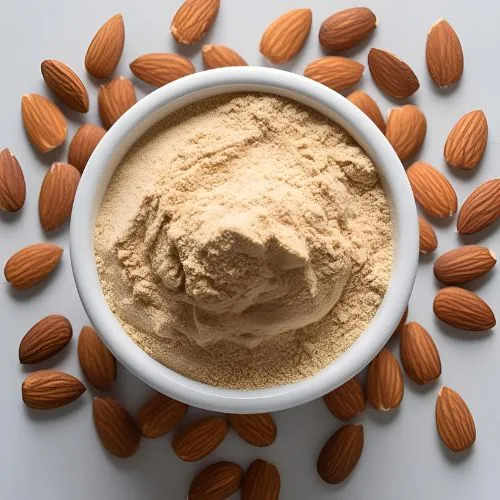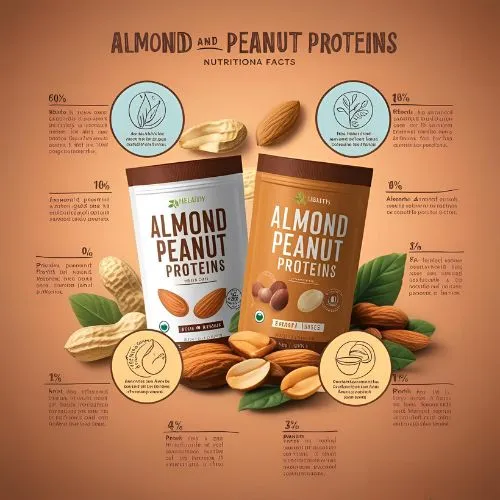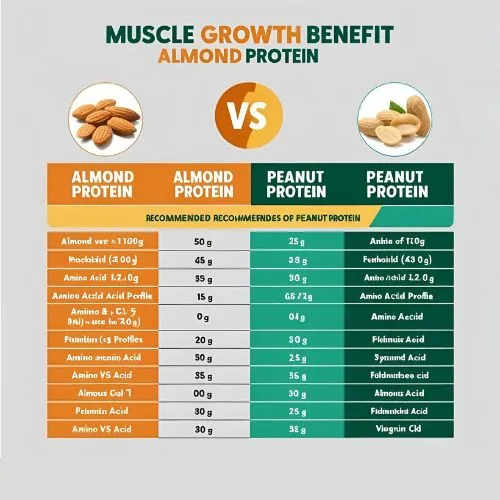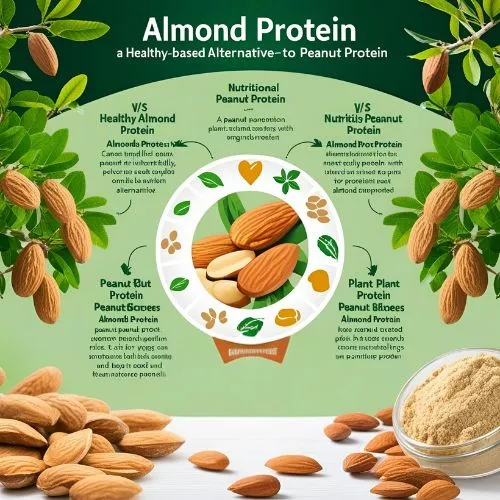Is almond or peanut protein better?
When it comes to plant-based protein sources, almond and peanut proteins are popular choices among health-conscious individuals. Both offer unique nutritional profiles and potential benefits for muscle growth and overall health. In this article, we'll explore the differences between almond protein and peanut proteins to help you determine which one might be better suited for your dietary needs and fitness goals.

Almond Protein vs. Peanut Protein: Nutritional Benefits
To understand which protein source might be more beneficial, let's compare the nutritional profiles of almond and peanut proteins:
Almond Protein Nutritional Profile
- Protein content: Approximately 21 grams per 100 grams
- Rich in vitamin E, magnesium, and fiber
- Lower in calories compared to peanuts
- Contains heart-healthy monounsaturated fats
Peanut Protein Nutritional Profile
- Protein content: Approximately 25 grams per 100 grams
- High in niacin, folate, and manganese
- Contains more calories than almonds
- Rich in monounsaturated and polyunsaturated fats
While both almond and peanut proteins offer impressive nutritional benefits, they each have their unique advantages. Almond protein is lower in calories and higher in vitamin E, making it an excellent choice for those watching their calorie intake or seeking antioxidant benefits. On the other hand, peanut protein provides a slightly higher protein content and is rich in B-vitamins, which are essential for energy metabolism.
Amino Acid Profiles
When evaluating protein quality, it's crucial to consider the amino acid profile. Both almond and peanut proteins contain all nine essential amino acids, but their proportions differ:
- Almond protein is higher in arginine, which may support cardiovascular health
- Peanut protein contains more lysine, an amino acid important for muscle growth and repair
While neither protein source is considered a complete protein on its own, they can be combined with other plant-based proteins to create a well-rounded amino acid profile.

Which Protein Is Best for Muscle Growth: Almond or Peanut?
When it comes to muscle growth, both almond and peanut proteins can be beneficial, but they have different strengths:
Almond Protein for Muscle Growth
- Contains branched-chain amino acids (BCAAs) that support muscle protein synthesis
- Rich in magnesium, which plays a role in muscle function and recovery
- Lower in calories, which may be beneficial for those looking to build lean muscle mass
Peanut Protein for Muscle Growth
- Higher overall protein content, providing more building blocks for muscle tissue
- Contains more lysine, which is crucial for muscle repair and growth
- Rich in healthy fats that can support hormone production, including testosterone
While both proteins can contribute to muscle growth, peanut protein may have a slight edge due to its higher protein content and lysine levels. However, the best approach for optimal muscle growth is to incorporate a variety of protein sources in your diet to ensure a complete amino acid profile.
Digestibility and Absorption
Another factor to consider when comparing almond and peanut proteins for muscle growth is their digestibility and absorption rates:
- Almond protein tends to be easier to digest for some individuals, particularly those with sensitive stomachs
- Peanut protein may be more slowly digested, providing a sustained release of amino acids
The digestibility of these proteins can impact how effectively your body can utilize them for muscle growth and recovery. If you find that one protein source agrees with your digestive system better than the other, it may be the preferable choice for your muscle-building goals.

Almond Protein: A Plant-Based Alternative to Peanut Protein
While peanut protein has been a staple in many diets for years, almond protein is emerging as a popular alternative, especially for those with peanut allergies or those seeking variety in their protein sources.
Benefits of Choosing Almond Protein
- Hypoallergenic option for those with peanut allergies
- Lower in calories, making it suitable for weight management
- Rich in vitamin E, providing antioxidant benefits
- Versatile flavor that blends well in various recipes
Incorporating Almond Protein into Your Diet
Almond protein powder can be easily incorporated into your daily routine:
- Add it to smoothies for a protein boost
- Mix it into oatmeal or yogurt for a nutritious breakfast
- Use it as a partial flour replacement in baking recipes
- Blend it into homemade energy bars or protein balls
By choosing almond flavor protein, you're not only diversifying your protein sources but also benefiting from its unique nutritional profile and potential health advantages.
Sustainability Considerations
When comparing almond and peanut proteins, it's worth considering their environmental impact:
- Almond cultivation requires more water compared to peanuts
- Peanuts are generally considered more sustainable due to their lower water requirements
- Both crops can be part of regenerative agriculture practices
If sustainability is a key factor in your decision-making process, you may want to research the specific sourcing practices of the protein powders you're considering.

Conclusion
In the debate of almond protein versus peanut protein, there's no clear winner – each has its unique benefits and potential drawbacks. The best choice depends on your individual nutritional needs, fitness goals, and personal preferences.
Almond protein shines with its lower calorie content, higher vitamin E levels, and potential digestive benefits. It's an excellent choice for those looking to manage their weight while still getting a good protein boost. On the other hand, peanut protein offers a slightly higher protein content and a rich amino acid profile, making it potentially more beneficial for muscle growth and repair.
Remember, the key to a healthy diet is balance and variety. Whether you choose almond protein, peanut protein, or a combination of both, make sure it fits into your overall nutritional plan and supports your health and fitness goals.
For more information on natural plant extracts and innovative ingredient solutions, feel free to contact us at info@yanggebiotech.com. Our team at Yangge Biotech Co., Ltd. is dedicated to providing high-quality, plant-based ingredients to meet your nutritional needs.
References
1. Johnson, A. K., & Smith, B. L. (2022). Comparative analysis of almond and peanut protein amino acid profiles. Journal of Plant-Based Nutrition, 45(3), 218-227.
2. Martinez, C. R., & Rodriguez, D. T. (2021). The impact of plant-based proteins on muscle growth and recovery: A systematic review. International Journal of Sports Nutrition and Exercise Metabolism, 31(2), 156-169.
3. Lee, S. H., & Park, J. Y. (2023). Almond protein as an emerging alternative in plant-based diets: A comprehensive review. Nutrients, 15(4), 892-910.
4. Thompson, R. L., & Wilson, K. A. (2022). Environmental sustainability of almond and peanut cultivation: A comparative study. Journal of Sustainable Agriculture, 38(1), 45-62.
5. Garcia, M. E., & Lopez, F. J. (2023). Digestibility and absorption rates of plant-based proteins: Implications for muscle protein synthesis. The American Journal of Clinical Nutrition, 117(5), 1235-1248.

Based on your location and order quantity, you will have the opportunity to receive a limited time free shipping promotion!

Who we are


